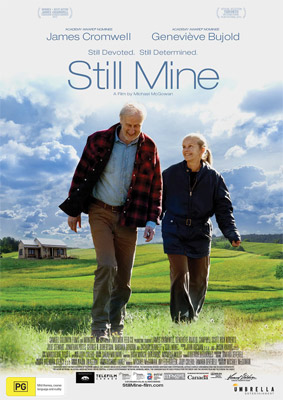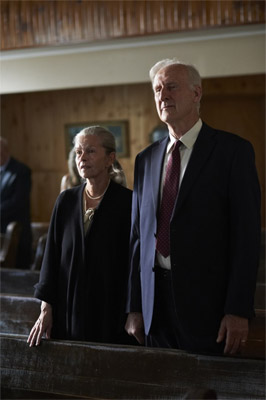Michael McGowan Still Mine Interview

Michael McGowan Still Mine Interview
Cast: James Cromwell, Genevieve Bujold, Campbell Scott
Director: Michael McGowan
Genre: Drama
Rated: PG
Running Time: 102 minutes
Synopsis: Michael McGowan's Still Mine is an exquisitely mounted and deeply affecting love story about one man's determination to create a suitable home for his ailing wife. Veterans James Cromwell and Genevieve Bujold are nothing short of magnificent in the story of a couple with a deep and complicated past.
When her health begins to fail, Craig Morrison is faced with the choice of either building a new, more suitable home for Irene or leaving the farm they have lived on for decades. A skilled carpenter, he imagines the only obstacles he faces are time and the weather. That is, until he meets Rick, a government inspector who makes it his personal mission to halt construction on the new house.
In a cinematic world obsessed with youth, Still Mine is in part about the battle between heritage and modernity and a refreshing look at the value of commitment and long term relationships. Craig and Irene's relationship is far richer because of the past they've shared.
Their conversations are changed, direct, and laden with subtext – not the kind of empty, verbal jousting we might see in a contemporary romance. They need all their wits about them as Irene becomes increasingly ill. Amidst a series of stop-work orders, Craig races to finish their house. Hauled into court and facing jail, Craig takes a final stance to save his home.
Still Mine
Release Date: June 6th, 2013
Website: www.umbrellaent.com.au
Interview with Michael McGowan
Question: The script is based on a true event. Can you tell us how you came upon the story? And what it was about it that appealed to you?
Michael McGowan: I was working on a different script about the resilience of old age and a character who refused to go gently into that good night. At that point, I still hadn't cracked the story when I read an article about Craig and his struggles with the building department in the Globe and Mail. Thematically it was exactly what I had been trying to write for the past few months but it had the huge advantage of being true. The appeal was the man, who at 88, decided to build himself and his wife a new house. His self-reliance was as inspiring as his vision for the life he and Irene could still lead. That there was a natural foil in the building department inspector seemed dramatic. Because Craig was 91 and I didn't want to bother him, I called his lawyer, Gary Fulton, who let me know speaking with Craig would not be a problem. Thenext day I met with Craig and his family in New Brunswick. I wanted to get a sense of the man and was relieved that he was as charming and inspiring in real life as he came off in the article. An added bonus was that I discovered St. Martins and realised that the entire Bay of Fundy region would make an incredible backdrop for a story. Even in late-November, from the red clay cliffs to the covered bridges and village houses (many over 200 years old), the area felt cinematic.
When I met Craig, I explained what I was hoping to do with his story and found out more about his life. After meeting members of his family, Craig took me around in his truck and showed me his land, explained the history of the region, things he had built, areas he had logged, land he owned. Craig, a huge Blue Jays fan, even showed me a baseball that he personally had signed by Babe Ruth and Lou Gehrig when he was ten years old.
 A couple of weeks later, I flew back and optioned the story. Throughout the process of writing, both Craig and his family were very helpful. Marty Klinkenberg, who wrote the original article in the Telegraph-Journal, and Gary Fulton, his lawyer, were also a big help in detailing the situation and struggles with the building department. A highlight for me was shooting in New Brunswick and having Craig and James Cromwell meet. That there's a similarity of spirit and physicality was apparent to everyone. Even Marty Klinkenberg commented that he thought James Cromwell was the perfect casting choice. Craig recently celebrated his 93rd birthday.
A couple of weeks later, I flew back and optioned the story. Throughout the process of writing, both Craig and his family were very helpful. Marty Klinkenberg, who wrote the original article in the Telegraph-Journal, and Gary Fulton, his lawyer, were also a big help in detailing the situation and struggles with the building department. A highlight for me was shooting in New Brunswick and having Craig and James Cromwell meet. That there's a similarity of spirit and physicality was apparent to everyone. Even Marty Klinkenberg commented that he thought James Cromwell was the perfect casting choice. Craig recently celebrated his 93rd birthday.Question: Can you describe the character Craig? And what did James Cromwell bring to the role?
Michael McGowan: Craig is a proud man who's looked after his wife and seven kids by working the land, by being self-reliant. He doesn't want to give up the land because it's integral to his well-being and a part of his identity. Craig is the kind of guy who knows everything, from how to build a road to how to build a house. There's an incredible independence of spirit that I found truly inspiring.
James Cromwell brought all of that and more to the role. When I first discussed the script with James, the level of attention he brought to every sentence of dialogue was astounding. He challenged everything he didn't understand, but only in a way that made the story much stronger. It was wonderful to have a true collaborator on set every day who wanted to make the best possible film. From working with chainsaws and tractors to collaborating on blocking, James was a major part of the filmmaking process behind the camera as well as in front of it. Though he's been around film sets all his life (his father was a Hollywood director), James doesn't bring any baggage with him. It's all about the work and ensuring that we're making the best possible decisions. Because James also has the range to play everything from beloved characters (Farmer Hoggett in Babe) to truly intimidating ones (Dudley Smith in L.A. Confidential), I knew that he'd be perfect to balance the different sides of Craig's personality. He seamlessly navigates the feelings Craig goes through as he watches Irene's health decline – anger, frustration, sadness, helplessness, tenderness and acceptance – yet he always returns to that gentle sense of humour that Craig and Irene share.
Question: Can you also describe the character Irene? And what did Geneviève Bujold bring to the role?
Michael McGowan: The real Irene had slipped almost entirely into dementia when I met her. However, there was something radiant and beautiful about her being in the new house, having a view of the Bay of Fundy. She seemed content. Geneviève found a strength in the stillness in the character of Irene and used that as a point of departure for her performance. She stayed in character for much of the shoot and was meticulous in tracking Irene's decline. Geneviève felt strongly about appearing very natural. She virtually had no make-up and did her own hair. Because Geneviève does such interesting things as an actor, whether she's speaking or not, I often ran the scene much longer before calling 'cut" because of the nuances she revealed about Irene non-verbally.
Question: The film evokes both tears and laughter (thanks to the wry humour). How important is the humour to the story?
Michael McGowan: Craig Morrison has a great sense of humour. He has a wit and charm that I often associate with the East Coast. As such, I wanted to get that spirit and humour into the story. In my other films I have found juxtaposing humour with other emotions has worked quite well. Perhaps it's part of my Irish heritage – that you can laugh at a funeral.
Question: What were the challenges of building a house from scratch for the film?
 Michael McGowan: The biggest challenge was trying to fit the construction into our production schedule. Because we needed to build a house in a very short period of time, we debated whether or not to start with a completed house and remove sections or vice versa. Ultimately, to match the seasons better, we chose the latter. The challenge was to schedule both the needs of filming and the needs of the construction crew. Instead of trying to capture the entire building process, we focused on key stages and interspersed them throughout the shooting schedule in order to give the builders time to assemble the house. Because much of the work was prefabricated at a shop nearby, the house went up very quickly. As an added bonus, our producer and production designer had a weekend place nearby – so, instead of tearing down the house, it now is on her land.
Michael McGowan: The biggest challenge was trying to fit the construction into our production schedule. Because we needed to build a house in a very short period of time, we debated whether or not to start with a completed house and remove sections or vice versa. Ultimately, to match the seasons better, we chose the latter. The challenge was to schedule both the needs of filming and the needs of the construction crew. Instead of trying to capture the entire building process, we focused on key stages and interspersed them throughout the shooting schedule in order to give the builders time to assemble the house. Because much of the work was prefabricated at a shop nearby, the house went up very quickly. As an added bonus, our producer and production designer had a weekend place nearby – so, instead of tearing down the house, it now is on her land.Question: Have you had any experience in building a home?
Michael McGowan: I actually worked as a carpenter for a year and made furniture. When we built our family home in Mulmur (an hour's drive from Toronto), I acted as general contractor and did the carpentry on items like the stairs, built-in shelves and outside doors. That experience helped me understand what when into the building of Craig's house.
Question: Why did you choose the title 'Still"?
The movie premiered at the Toronto Film Festival under the title 'Still" but was later changed to 'Still Mine" for its theatrical release
Michael McGowan: 'Still" is a word that has multiple meanings that apply to the themes of the film. 'Still" can mean striving, not giving up. I love the fact that at an age when most people are either dead or close to it, Craig still has the passion to build a house. He never let his age be an impediment. As such, he ends up being an inspiration. 'Still" also means to make quiet. As Irene slides deeper into her dementia, her mind becomes quieter.
MORE
- Mission: Impossible Fallout
- Glenn Close The Wife
- Allison Chhorn Stanley's Mouth Interview
- Benicio Del Toro Sicario: Day of the Soldado
- Dame Judi Dench Tea With The Dames
- Sandra Bullock Ocean's 8
- Chris Pratt Jurassic World: Fallen Kingdom
- Claudia Sangiorgi Dalimore and Michelle Grace...
- Rachel McAdams Disobedience Interview
- Sebastián Lelio and Alessandro Nivola...
- Perri Cummings Trench Interview



